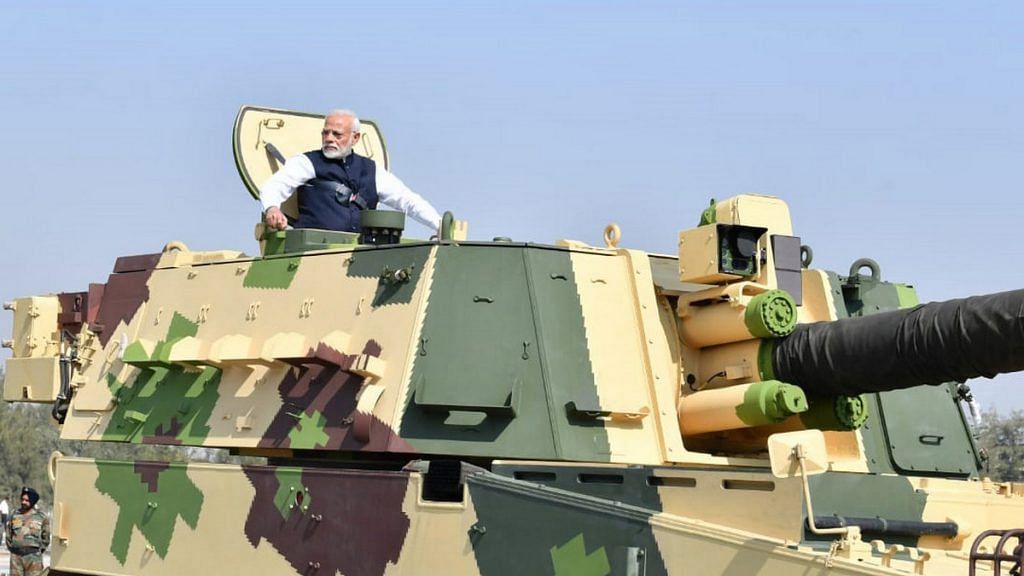In the wake of the Balakot air strikes, India is about to witness its first ‘national security’ political campaign, which comes at the cost of numerous economic and social problems.
The political class, however, must remember that sooner than later a deified and politicised military can become a law unto itself. In its extreme form, it can lead to the creation of a national security state like Pakistan. In a national security state, the military becomes the all-powerful authority that not only ensures external and internal security, but also exerts overriding influence over political and economic affairs of the state.
Also read: Not even 1% of Indian MPs have served in the military. And that’s concerning
Media and mood of the nation
A recent exchange between union minister Piyush Goyal and journalist Rahul Kanwal at the India Today Conclave acutely illustrates the present state of the Indian media, military’s accountability, its deification, and its blatant political exploitation.
“Do you believe this … puts some pressure on India to convince the world, and the public and the opposition that indeed the mission was successful?” Rahul Kanwal asked the obvious question on the conflicting claims about the casualties and the damage inflicted in Balakot.
The question offended the minister and he responded aggressively, “Are you convinced first? Are you a part of this narrative that is trying to belittle our armed forces?” “I wonder … where this country is going if you’re going to have this kind of thinking also, that you’re going to accept what Pakistan says, and… colleagues of yours are going to propagate the Pakistan theory in India. I think it’s a matter of shame,” the minister said.
Kanwal, however, argued that a question to a BJP minister doesn’t become a question to the armed forces.
But, the media in the last five years has become a party to the politically driven neo-nationalist sentiment, which deifies the military and blurs the distinction between armed forces and the government. Most journalists have stopped questioning the government and the armed forces on national security and have gone along with this perceived ‘mood of the nation’.
It is indeed poetic justice that media’s servility in the last few years has now come back to haunt journalism.
Also read: First OROP, now cantonment roads: India sees rise of military as political pressure group
Armed forces and accountability
The armed forces are as accountable to the people as any other institution in a democratic country. More so, when they are a necessary organisation maintained with taxpayer’s money. The government, the media and the public must question the armed forces with regard to their preparedness for any mission assigned to them, and their performance while executing it.
Had pertinent questions been asked of the government and the military in the 1950s, then we would not have suffered a catastrophic defeat in 1962.
It is ludicrous for the government to advance the logic that ‘armed forces have been given complete freedom’ and one cannot ‘question’ them. Armed forces are given political directions with certain limitations and ‘freedom of action’ is restricted to execution.
Anti-national criticism
In most societies, people love and admire the armed forces. An ideology driven government often exploits this sentiment. On national security issues, criticism of the government becomes criticism of the military, which is considered anti-national.
As per empirical wisdom, the military by nature is a status-quoist organisation and requires external stimulus for reform, which can come from the government, the media or the public. With dissenters and military reformists being labelled ‘enemies of the nation’, modernisation of the armed forces has been stymied.
Also read: Indian armed forces up against an adversary they aren’t trained to fight — politicians
Politicisation of armed forces
Once no distinction is left between a political government and the military, the next logical step is exploitation of the latter for electoral gains. Military-themed political posters and politicians campaigning in military fatigues post-Balakot are examples of that trend.
Have no doubts that what we are likely to witness in the near future is politicisation of the armed forces. Politicisation implies that the armed forces identify with a political ideology or a political thought-process and start exercising influence in the affairs of the state. Military advice on national security becomes biased as does its actions with respect to internal security. This does not augur well for a multi-cultural, multi-lingual and multi-religious society that requires a secular and apolitical military.
A politicised military can then lead the way for the creation of a national security state. Do not let the genie out of the bottle!
Lt Gen H.S. Panag PVSM, AVSM (R) served in the Indian Army for 40 years. He was GOC in C Northern Command and Central Command. Post retirement, he was Member of Armed Forces Tribunal.
